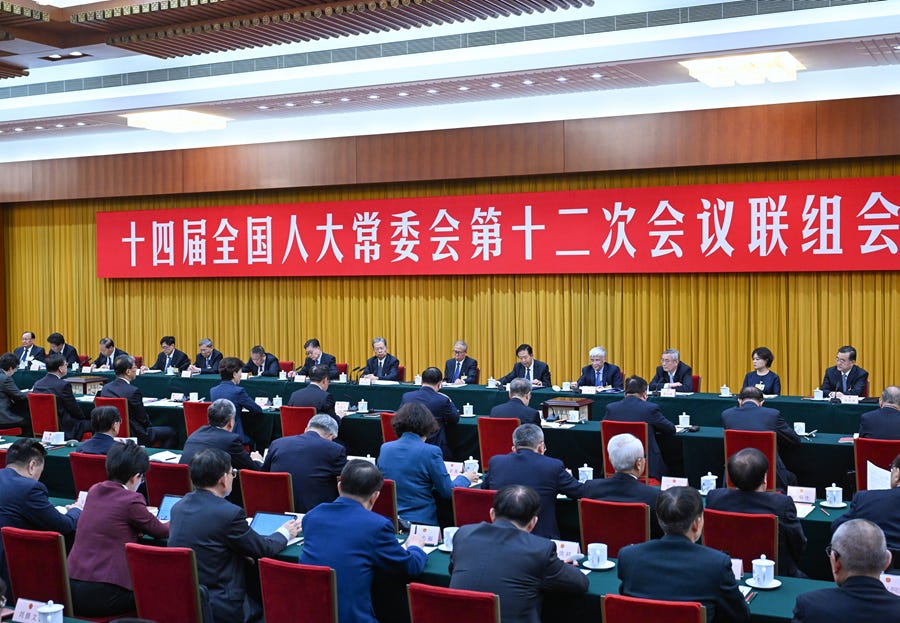November 2024: First Updates to China’s Law on Legislative Oversight
New R&R guiding cases on correcting local market-entry barriers, ultra vires punishments for untrustworthiness & improperly issued regulatory documents. Plus: four new draft laws.
Welcome back to NPC Observer Monthly, a monthly newsletter about China’s national legislature: the National People’s Congress (NPC) and its Standing Committee (NPCSC).
Programming Note: While I anticipate important news from the NPCSC’s end-of-year session this month, I don’t expect to publish the next issue of this newsletter until mid-January at the earliest, due to the press of other obligations and holiday travels. But I do intend to promptly cover major NPC developments on our main site in the meantime, so follow us over there—and on Bluesky1—for the latest news.
If you’re enjoying the newsletter, I hope you’ll consider sharing it. —Changhao
News of the Month
On November 1, the revised Emergency Response Law [突发事件应对法] (adopted on June 28, 2024) took effect. I highlighted three areas of changes to the Law in this post:
On November 4–8, the 14th NPCSC convened for its 13th session and approved eight bills at the end of the five-day session. First, it adopted a decision authorizing an increase in local government debt limits to repay hidden debt, which I’ve already covered here:
Second, the NPCSC renewed a pilot program to suspend two provisions of the Metrology Law [计量法] in six so-called “pilot cities for business environment innovation”: Beijing, Shanghai, Chongqing, Hangzhou, Guangzhou, and Shenzhen. As we have previously explained, “[the two provisions at issue] require that a company’s internal ‘highest standard instruments of measurement’ [最高计量标准器具]—essentially the company’s most precise measurement standards that are used as references for calibration—be assessed by the weights and measures department and undergo compulsory calibration. Under the pilot, the companies in the six cities are allowed to manage such standards on their own, subject to other forms of regulatory oversight.” At the State Council’s request, the NPCSC extended the pilot by three years; it will now expire on October 23, 2027.
Finally, the NPCSC also passed six laws:
Preschool Education Law [学前教育法] (effective June 1, 2025);
Energy Law [能源法] (effective Jan. 1, 2025);
revision to the Cultural Relics Protection Law [文物保护法] (effective Mar. 1, 2025);
revision to the Mineral Resources Law [矿产资源法] (effective July 1, 2025);
revision to the Anti–Money Laundering Law [反洗钱法] (effective Jan. 1, 2025); and
amendment to the Law on Oversight by the Standing Committees of People’s Congresses (Oversight Law) [各级人民代表大会常务委员会监督法] (effective immediately).
Having no informed commentary to offer on the first five, I’ll discuss only the Oversight Law amendments below.
At last month’s session, the NPCSC also reviewed the following bills, on which it sought public comment through December 7:
draft amendment to the Law on the Delegates to the National People’s Congress and Local People’s Congresses [全国人民代表大会和地方各级人民代表大会代表法];
draft revision to the Arbitration Law [仲裁法];
draft revision to the Maritime Law [海商法]; and
draft revision to the Science and Technology Popularization Law [科学技术普及法].
Oversight Law Amendments
Starting with some background. The NPCSC enacted the Oversight Law in August 2006 after four years of deliberations. I discussed some of the controversies that contributed to the protracted process in the last issue of this newsletter.
The Law governs the procedures whereby the standing committees of the people’s congresses (from the county level up) conduct oversight. It specifically provides for the use of seven oversight tools:
hearing special work reports by other state institutions;
conducting fiscal and economic oversight;
inspecting the enforcement of laws and regulations;
inquiries and interpellations;
organizing investigative committees for specific issues; and
deciding on bills of dismissal.
While the Law was not updated for almost 17 years after it took effect in 2007, legislative oversight in China has continued to evolve in practice and through the enactment of other legal authorities. In the past decade alone, the NPCSC amended the Budget Law (zh | en) (2014); adopted or updated separate instruments governing its oversight of economic policymaking (zh | en) (2021), the central budget (zh | en) (2021), and state-owned assets (zh | en) (2020); twice (2015 and 2023) amended the Legislation Law [立法法] to improve the system of recording and review and approved a “mini law” on the subject last December; and, most recently, established a mechanism for reporting on government debt in September. In 2010, the NPCSC also began holding “special inquiries”—China’s rough equivalent of parliamentary oversight hearings—an oversight tool that the NPCSC codified when amending its Rules of Procedure in 2021. The overall tenor of those reforms was to “give more teeth to NPCSC oversight by offering additional oversight tools backed by follow-up measures.” Local people’s congresses have largely followed suit by making similar changes to their oversight practices.

Last month’s Oversight Law amendments (translated here) primarily sought to reflect those developments. For instance, they authorize the subordinate bodies of people’s congresses to conduct their own research on the topic of a work report or a special inquiry to aid lawmakers in their review (see arts. 13, 28 & 49 as amended). They also provide for follow-up oversight after a standing committee has heard a relevant report or held a special inquiry (see arts. 17, 29, 37 & 50). As the amendments for the most part did not go beyond prior reforms, their impact on the ground will be limited.
I’ll close by highlighting two new-ish provisions. First, article 25 as amended requires the State Council and each local government at or above the county level to report annually to the standing committee of the people’s congress at the same level on the management of government debt. As mentioned earlier, the State Council submitted the first such report only in September, and it appears that local people’s congresses had not universally required such reports before the amendments passed.
Second, the amendments expanded the universe of “normative documents” [规范性文件] that are subject to legislative oversight through the “recording and review” (R&R) [备案审查] mechanism. Colloquially known as “red-letterhead documents” [红头文件], normative documents are official documents that, while not considered formal legislation,2 still have an impact on private rights and obligations. The original Oversight Law subjected only the “decisions or orders” of people’s governments to legislative review, whereas the amendments have broadened the scope to encompass all normative documents issued by not only people’s governments, but also by supervision commissions, courts, and procuratorates. As most—but not all—local legislatures had already adopted this change, the amendments will standardize the scope of legislative review of normative documents nationwide.
Legislative Oversight of Normative Documents in Action
Relevant to the Oversight Law’s new R&R provisions, on November 21, the NPCSC Legislative Affairs Commission released the third batch3 of R&R guiding cases of 2024. Such cases are chosen to serve as “direct references” for local legislative and R&R work, and all three in this batch involved local legislative review of administrative normative documents (aka regulatory documents). I will briefly discuss each below.
Guiding Case 2024 No. 3-1: In March 2023, the government of the Garzê (or Ganzi in pinyin) Tibetan Autonomous Prefecture4 in Sichuan issued a document on managing “key resources,” including tourism resources, clean energy, and mineral resources. As relevant here, the document requires an entity authorized to develop such resources to register as a company in the Prefecture. Upon review, the prefectural legislature concluded that the provision at issue was consistent with a trio of upper-level documents: a 2022 policy document by the Party and the State Council on building a “unified national market,” as well as national and Sichuan provincial regulations on “improving the business environment.” All three prohibit local governments from setting market-entry conditions, such as requiring companies to register locally, without a legislative basis. What complicated things, however, was that the prefectural government borrowed the requirement from a legislative rule issued by the Sichuan provincial government. The prefectural legislature therefore sought guidance from its provincial counterpart. The latter concluded that neither the prefectural document nor the provincial government rule comported with the central policy of “breaking down local protectionism and regional barriers,” so both must be amended. The prefectural government reissued the document a few months later, while the provincial rule is still being amended.
Guiding Case 2024 No. 3-2: In 2019, Chongqing’s municipal housing commission issued a regulatory document on the “credit management” of property management companies. For a company with a credit level of B or lower, the document authorizes various punishments, including restrictions on participating in government procurement, applying for government-funded projects, or enjoying tax incentives. Upon review, the Chongqing municipal legislature concluded that such punishments violated a State Council policy document on social credit and Chongqing’s own social credit regulations. Under these two instruments, punishments for untrustworthiness must have a basis in laws, regulations, or national policy documents, and must appear in publicly promulgated lists. Because the punishments at issue did not meet those requirements, the housing commission’s document must be amended. In November 2023, the commission reissued the document without the offending provisions.
Guiding Case 2024 No. 3-3: In 2011, the general office of the Guangzhou municipal government issued a document on investigating and controlling illegal constructions. Among other things, the lengthy document sets forth in exhaustive detail the responsibility of each government agency over such efforts. The municipal government claimed that the document was drafted and issued as an internal document and had not been cited as the basis for forced demolitions of illegal constructions. Upon review, the Guangzhou municipal legislature concluded that, because the document implicated private rights and obligations and was publicly released—two key criteria of regulatory documents—it would not be obvious to the public that it was merely an internal document. (In my view, the guiding case could benefit from additional discussions on how exactly the document implicated private rights and obligations.) And because the document at issue had no expiration date, when all regulatory documents must have one under the Guangzhou government’s own rules, the municipal legislature requested its repeal. The general office complied in October 2023.
That’s all for this month’s issue. Thanks for reading!
Here’s our preview of NPC-related events in December 2024. If you wish to get all our coverage in your inbox in real time, subscribe here!
Taige Hu contributed to this post
We are not leaving Twitter just yet, but will certainly be spending less time there.
The legislative review of formal legislation, such as “local government rules” [地方政府规章], is governed instead by the Legislation Law and related authorities.
Astute readers might note that I haven’t written about the second batch of this year’s R&R guiding cases (I covered the first batch here). That’s because, as I was informed by a law professor close to the Legislative Affairs Commission, the agency decided not to disclose the second batch, for reasons unknown.
The Legislative Affairs Commission anonymized all the local documents at issue; any identified locality was the result of our own research based on the information disclosed by the guiding cases.



